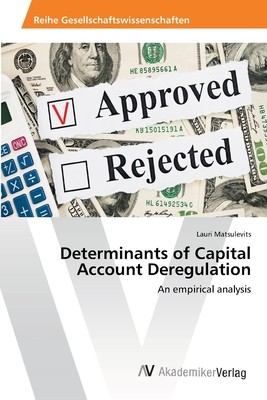
- We will send in 10–14 business days.
- Author: Lauri Matsulevits
- Publisher: AV Akademikerverlag
- Year: 2012
- Pages: 60
- ISBN-10: 3639424573
- ISBN-13: 9783639424577
- Format: 15.2 x 22.9 x 0.4 cm, softcover
- Language: English
- SAVE -10% with code: EXTRA
Reviews
Description
There is plenty of empirical evidence that free capital flows improve allocative efficiency, enhance investments and create investment opportunities. The effect on growth, though, is debated but there is evidence that at least opening to less volatile types of capital flows is beneficial to the economy. This paper looks into the determinants of capital account deregulation. It concludes that democracy, trade openness and income level generally reduce capital account restrictions, which is in line with previous empirical findings and confirms the theoretical assumption that under democracy, governments are encouraged to liberalize even if the outcome of reforms cannot be exactly predicted. Besides, public domestic debt and inflation contribute to higher outflow restrictions and the effect of these two variables is more noticeable in countries with fixed exchange rate regimes.
EXTRA 10 % discount with code: EXTRA
The promotion ends in 20d.07:03:38
The discount code is valid when purchasing from 10 €. Discounts do not stack.
- Author: Lauri Matsulevits
- Publisher: AV Akademikerverlag
- Year: 2012
- Pages: 60
- ISBN-10: 3639424573
- ISBN-13: 9783639424577
- Format: 15.2 x 22.9 x 0.4 cm, softcover
- Language: English English
There is plenty of empirical evidence that free capital flows improve allocative efficiency, enhance investments and create investment opportunities. The effect on growth, though, is debated but there is evidence that at least opening to less volatile types of capital flows is beneficial to the economy. This paper looks into the determinants of capital account deregulation. It concludes that democracy, trade openness and income level generally reduce capital account restrictions, which is in line with previous empirical findings and confirms the theoretical assumption that under democracy, governments are encouraged to liberalize even if the outcome of reforms cannot be exactly predicted. Besides, public domestic debt and inflation contribute to higher outflow restrictions and the effect of these two variables is more noticeable in countries with fixed exchange rate regimes.


Reviews